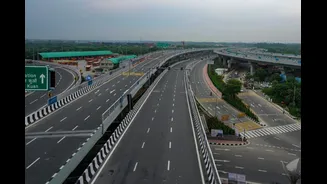The Supreme Court praised the rapid transformation of India’s road transport sector, noting that the country has made “sincere and serious attempts to revolutionise travel” and achieved a “quantum leap”
in infrastructure development in recent years.
A Bench of Justice Dipankar Datta and Justice A.G. Masih made the observations while ruling on a dispute involving private transporters and the transport corporations of Uttar Pradesh and Madhya Pradesh. The Supreme Court ultimately held that private transport operators cannot ply on inter-state routes reserved for a State Road Transport Corporation (SRTC) but used the judgment’s closing section to reflect at length on India’s broader transport evolution.
‘From Humble Beginnings To Last-Mile Connectivity’
The Supreme Court said India has moved far beyond its modest road network of earlier decades and now boasts an “intricate” system of highways that connect even the remotest villages to nearby towns and cities. This last-mile connectivity, it said, has been critical in improving mobility and driving economic growth.
Expressways, the Bench noted, have dramatically cut travel time by enabling faster movement of people and goods across long distances.
“The highways and expressways being built are transforming India’s transportation landscape,” the judges observed.
Smoother Roads, Modern Buses And A Shift To EVs
The Supreme Court also highlighted noticeable improvements in road quality, saying the surfaces of new highways and expressways are “smoother than ever before.”
It said the rise of modern vehicles, including electric buses, has elevated passenger comfort to levels “comparable with services available abroad.” While older buses remain on some routes, the Supreme Court acknowledged that e-buses and other upgraded fleets have begun reshaping travel in many sectors.
‘Digitalisation Has Been A Game Changer’
Calling technology a defining feature of India’s transport progress, the Supreme Court observed that “smart transportation” now integrates digital tools to enhance efficiency and safety. Many SRTCs, it said, are “thriving” thanks to improved adoption of technology. Online booking platforms, mobile-app tracking, streamlined operations and improved customer experience were cited as evidence of how digitalisation has transformed state transport services.
Passengers’ Interests Must Remain Priority
While commending the country’s advancements, the Bench stressed that the interests of passengers and commuters must remain paramount for transport authorities.
“None can possibly dispute that the nation, having made substantial progress in the road transport sector, [must ensure] the interests of passengers and commuters are of prime concern,” the Supreme Court said.














